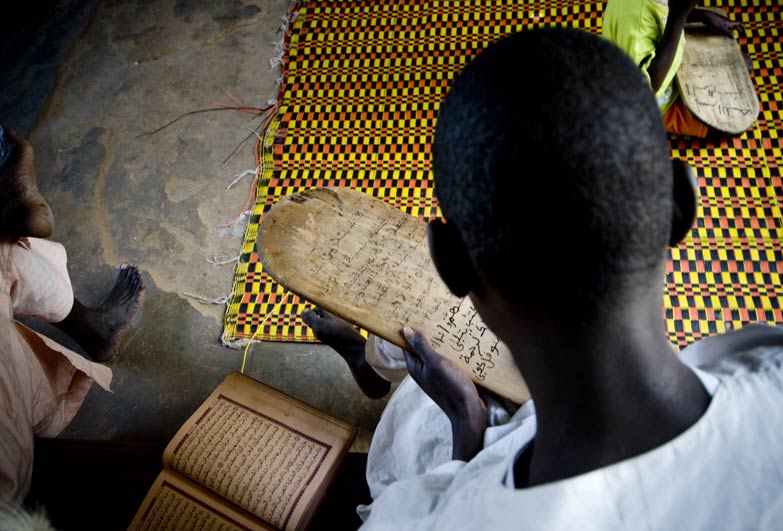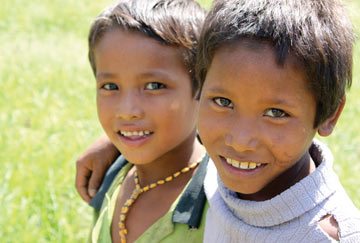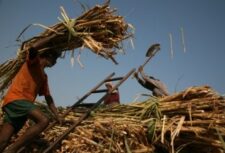Disclaimer: This article is more than 3 years old, and may not include the most up-to-date information or statistics. Please verify information with more recent sources as needed, and if you have any questions contact our Press Office.
Covid-19 has had a profound impact on the world, but it does not affect everyone equally.

15 July 2020
For people who are enslaved or vulnerable to slavery, the economic and social disruption caused by the Covid-19 pandemic is affecting their lives in new and profound ways. As Anti-Slavery International and its partners provide emergency outreach and support across the world – food, water, hygiene materials, education and information – we are observing and documenting the following five coronavirus-related impacts across the world.
1. Creating new risks and abuses
For children and young people, social isolation may increase their vulnerability to grooming and abuse. In normal times, some Quranic schools in West Africa carry out forced child begging. In those establishments, with many children now confined to school premises, they are subject to increased abuse and punishment because they are not bringing in an income. The challenges of self-isolation, social distancing and satisfactory hygiene are particularly difficult for enslaved people and many vulnerable communities living in slums, on the streets, or in crowded refugee and displaced persons camps.
In Mauritania, the Haratine people are routinely born into slavery and are owned by their ‘masters’. Many wealthy families have started to fire Haratine domestic workers, or to oblige them to be confined within the workplace to avoid travelling. This creates an impossible situation: to be unemployed and starve, or to stay with their employer and continue work, but leave their families alone without resources.
2. Increasing vulnerability to slavery
Lockdowns to try to halt the spread of the virus have led to mass layoffs as many global brands have cancelled orders and factories have been required to shut down. The garment industry has been particularly badly affected: by late March over one million workers in Bangladesh had been laid off or temporarily suspended. Similar crises are being experienced by workers across South and Southeast Asia, including Cambodia, India, Myanmar and Vietnam. Mass unemployment, high debt and little government safety net creates opportunities for traffickers. Acute economic disruption creates increased risks for the poorest people through food shortages and loss of income.
At the end of March, India declared a nationwide lockdown in response to Covid-19. In some villages, market stall holders are being given time to sell food. In other villages there is a total ban on selling. Wheat is ready for harvest, but likely to rot with the rains due and insufficient numbers of labourers to bring the crop in. Many agricultural migrant workers have seen wages drop by a third since last year. Handloom weavers have no work. There is a risk of widespread hunger across many parts of India in the months to come. Families with their livelihoods destroyed by social restrictions may be pressed into bonded labour for survival.
3. Worsening discrimination
Migrant workers returning home due to coronavirus restrictions are at great risk of infection when travelling on crowded public transport, stuck at borders or other bottlenecks where physical distancing is all but impossible. The Haliya people of western Nepal are lower-caste Dalits and often work as bonded agricultural labourers, even though the practice has been outlawed since 2007. As lockdown was being introduced, an estimated 150,000 migrants returned from neighbouring India to western Nepal. Testing is currently unavailable but it is likely many individuals will be infected with Covid-19, leading to their stigmatization and in some cases forcible isolation from the rest of their home community. Haliya families in Nepal are facing destitution. A rapid assessment of over 6,700 households found more than half are facing food shortages. The growing desperation creates vulnerability to human traffickers offering ‘underground’ work in construction or agriculture. With schools closed, children are also at risk of being sent out to work.
The dire situation may drive people back into the hands of local landlords and return to outlawed bonded labour, potentially undoing the work of AntiSlavery International and our partner in western Nepal over the past two years. Right now, our priority is delivering an emergency aid package of rice, lentils, oil, salt, soap, face masks and hand sanitiser to Haliya households in need. Once the pandemic recedes, we will continue to work on supporting Haliya Federation Representatives, keeping Haliya children in education, training female leaders and creating toolkits so people know their rights and are empowered to claim them.

Read our 2020 Reporter Magazine
Learn more about the impact of COVID-19 on the communities we support.
4. Increasing risk for migrant workers
In the UK, as we grapple with the pandemic, the ‘hostile environment’ policy is compounding the vulnerability of people trapped in modern slavery. Many are often too scared to reach out to authorities, even when they are in dire need of accessing essential support, such as healthcare. They fear being criminalised and detained, rather than being protected as a victim of crime. People in slavery are often forced to live in squalid, overcrowded conditions, with many in a room and without access to good washing facilities. The risk that someone with symptoms of coronavirus trapped in modern slavery avoids seeking medical help is a mortal threat to the wider community.
5. Disrupting anti-slavery efforts
Coronavirus lockdowns across the world have limited the operations of anti-slavery organisations. In Mali, the closure of markets risks leaving people destitute and forcing them to return to slavery or to migrate with their children, putting whole families at risk of exploitation or trafficking.
In former slave communities, the schools Anti-Slavery International set up and support are now closed, as part of a nationwide shut down. They usually act as community hubs and provide education and meals to the children of former slaves. Without this service, most families would struggle to feed their children and would have no other choice but to move to urban centres in search of employment or go back to slavery. Anti-Slavery International and our local partners are adapting to the situation by providing information, emergency food rations and hygiene materials to the poorest communities – prioritising families that have children enrolled in our community schools.
What happens now?
Right now, we are working with governments and partners to ensure:
- Inclusion: getting support to everyone who needs it.
- Protection: keeping people safe and their rights upheld.
- Mitigation: identifying and supporting victims.
As the crisis begins to pass, there will be a need to:
- Build community resilience to slavery and exploitation.
- Prevent the financial conditions that lead to slavery and exploitation.
- Enlist businesses to respect workers’ rights along the value chain.
We’ve set up the Anti-Slavery Solidarity Fund to ensure we can be there for everyone who needs us now and in the long term.
You can support our work today





